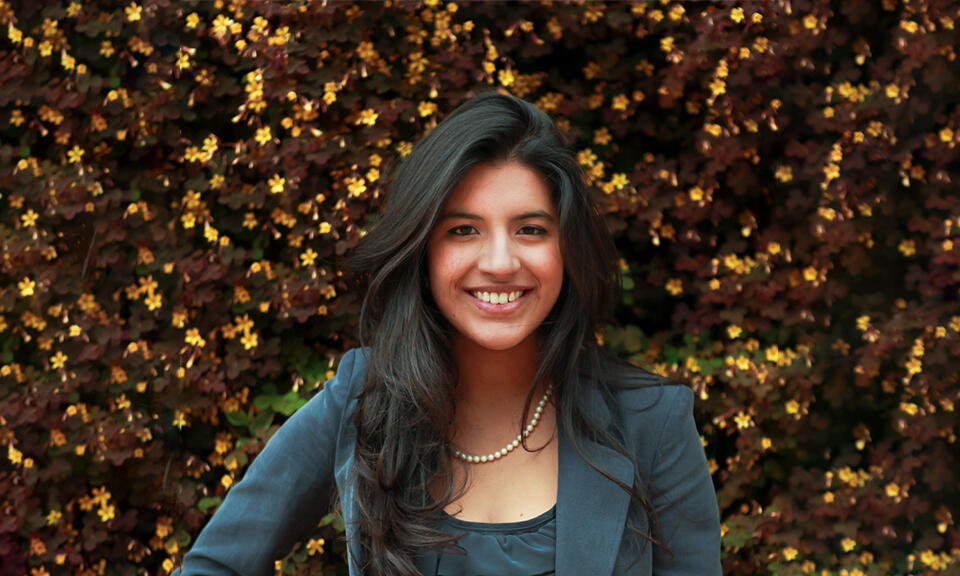Lara Gutierrez Santander

“Being able to study for a whole year a topic that I am so passionate about. Every module has been chosen to make the programme extremely interesting and tailored to the skillset that businesses and policymakers are demanding to tackle the climate crisis.”
About you
What work experience/internships did you have before beginning with Imperial Business School?
I worked for three years as part of the sustainability department of OPAIN S.A, the concessionaire in charge of the construction and operation of Colombia’s main international airport. I supported the development of the sustainability strategy and led the airport’s participation in the Airport Carbon Accreditation programme, the international industry-wide standard to decarbonise the airport sector. I also participated in several projects to measure and mitigate environmental and social impacts of airport operations and supervised the environmental compliance of the airport’s fuel supply system. Before that I had the opportunity to volunteer in forest and marine conservation research projects in Madagascar.
Why did you decide to study MSc Climate Change, Management & Finance at Imperial Business School?
I wanted to complement the technical and scientific knowledge that I gained in my environmental engineering degree with additional management and corporate finance skills. This will enable me to be successful at showing businesses how addressing their climate-related risks and opportunities could mean a competitive advantage for them, as well as allocating the financial resources that are necessary to transition to a low carbon economy.
While it was mainly the programme that attracted me, Imperial is of course a world-renowned university, and the links to the Grantham Institute and their work on the latest developments in climate science and policy were another big plus.
Programme
What aspects of the programme do you most enjoy the most?
I really enjoy that it is not just purely an academic programme, in the sense that there are opportunities to engage with business leaders in the sustainability field, as well as academics at the forefront of research in their areas. Most of the coursework is highly applicable to what one would do in a real job. There is a focus on the real world.
"I really enjoy that it is not just purely an academic programme, in the sense that there are opportunities to engage with business leaders in the sustainability field, as well as academics at the forefront of research in their areas."
Which has been your favourite module so far and why?
I have really liked Mitigating Climate Change for its detailed view of the diverse challenges and nuances of climate change mitigation. It really makes you think about the future and the challenges ahead. It also looks at the different tools available to meet these challenges. It is taught by Dr Joeri Rogelj, who has been the lead author for several IPCC reports and has been recently included by Reuters in their list of the world’s top climate scientists.
What has been the most rewarding part of the programme?
Being able to study for a whole year a topic that I am so passionate about. Every module has been chosen to make the programme extremely interesting and tailored to the skillset that businesses and policymakers are demanding to tackle the climate crisis. It has also been amazing to engage with such a diverse and multidisciplinary cohort; there are many nationalities and everyone has different areas of expertise which triggers very interesting debates and allows us to analyse topics from very different perspectives. It is amazing how much I have been able to learn from my cohort.
What has been the most challenging part of the programme?
I have found it academically challenging, particularly as I had never studied a degree in something other than my native language. But the challenging parts are where I have learned the most. It is easy to feel overwhelmed by this especially during exams where you have limited time. However, Imperial has a huge international community and the Business School has developed several tools to support us, such as Careers’ one-to-one appointments.
People
How would you describe your cohort at Imperial?
Diverse, collaborative, skilled and passionate. I think the nature of the challenge that the programme is preparing us to meet means that the cohort is really engaged in what we learn. Coursework is a pleasure in this context because most people are 100% invested in what they are doing which really translates into the quality of what they do. I have also made some lifelong friendships. Some of them have been exclusively built online!
Did you have a favourite professor/lecturer and why?
It is very difficult to choose just one because they are all excellent, but if I had to choose, I would pick Dr Jeffrey Hardy who teaches Energy Business & Strategy. His lectures were energetic, interactive and clear. In addition, he has a lot of experience in the UK electricity system which is an area in which I was very interested but did not know much about. He was also constantly looking for ways to incorporate our feedback into his lecture and he assigned us very interesting coursework in which we had to design an investment strategy for an airline in the context of falling oil prices.
Opportunities
What has been the greatest opportunity you have had at Imperial?
The greatest opportunity has been being able to be part of a global network of professionals that will probably end up holding leadership positions around the world and will be contributing towards the transition to a low-carbon economy. This programme has opened innumerable doors for me and I’m sure that it will continue to do so in the future.
Career
What are your future career goals and how have they been realised since being at Imperial?
I would like to continue working towards making the transport sector more sustainable. I am a big fan of aviation and I recognise the immense benefits that it has brought to our society, but it needs to become low-carbon as it grows rapidly in emerging economies. This programme has opened my eyes to the range of tools that are being developed precisely to tackle challenges such as this and shown me numerous options for how I can lead the change in future.
Have you received any job offers since commencing your programme?
I have accepted a work placement this summer with a sustainable investing fund called Trium Capital that seeks investment opportunities in sectors that are difficult to decarbonise. I will be working on a project about the European airline sector, which is exciting because it will be the perfect opportunity to combine my previous experience with the knowledge gained in this course. I am also participating in several application processes for long-term positions.
Tips
Looking back to when you were applying for the programme, did you attend any online webinars or on-campus information sessions?
I went to an alumni showcase event in Bogotá, which provided all the information I needed about the programme and the application process. I also spoke to people from my own educational system about how they translated what they had done into the UK context, which was invaluable. Definitely attend an event like this if you can.
What advice would you give someone who is thinking about applying for the programme?
Do it. The world increasingly needs professionals with the skillset that this programme provides. Don’t let the subject of your undergraduate degree be a limitation. There are probably many transferable skills that you acquired in your previous degrees and experiences that can be applied in this field. Tackling climate change will require people from diverse study and professional backgrounds. Climate change is not just an exclusively environmental issue anymore.
Related blogs
Meet the Specialised Masters’ Class of 2026
Hear from Imperial Business Specailised Masters's students 2025-2026

From Imperial to Impact
Hear from an MSc Climate Change, Management & Finance graduate on his journey, career support, and sustainability insights.
Imperial’s Extended term: enhanced flexibility for your programme
Enhance your Master’s or Full-Time MBA experience with our 16-month Extended term. Gain valuable real-world experience through an extended Work Placement or Global Exchange, strengthening your career credentials and expanding your professional network.


